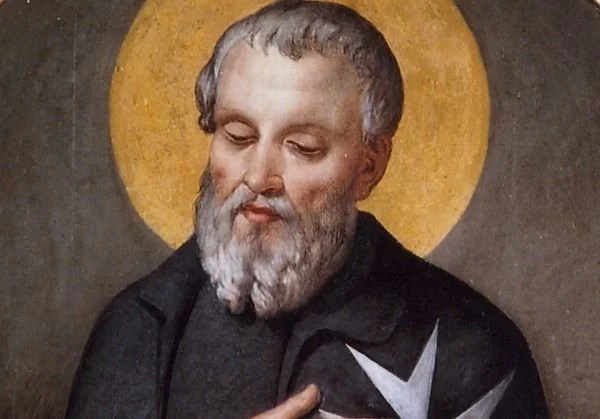Feast of Blessed Gerard
On Monday 13 October, we kept the feast of Blessed Gerard, Founder of Our Order, with a solemn mass at the church of Our Lady of the Assumption and St Gregory, Warwick Street.
By the time of the arrival of the First Crusade at Jerusalem in 1099, Gerard was already running the Hospital of St John, near the Holy Sepulchre. Many crusaders and pilgrims were attracted by his holy life and the service of the poor and sick, and joined his work, causing the Order to grow rapidly in size and importance.
Gerard died of natural causes on 3rd September 1120, and was quickly recognised across Europe as a man of Christian virtue. His remains were taken to Acre before the fall of Jerusalem in 1187, and later to Manosque in Provence. A few relics survived the French Revolution, some at Martigues, and his skull, now in the church of the Order’s Nuns in Malta. Sir George Bowyer brought his jawbone thence to the Order in England in around 1860, and it remains our greatest treasure. This relic was venerated at the end of Mass.
During Mass was also premiered a new setting of the Ordinary of the Mass by the English composer, organist, and educator, Ian Wicks. This Missa Brevis was commissioned by Suzanne Macgregor especially for the Order and we are very grateful for Suzanne’s generosity in this gift.
Holy Mass was celebrated by Fr Stephen Morrison O.Praem., chaplain of the Order, whose homily we are pleased to be able to reproduce below.
At the end of Mass there followed the investiture of this year's recipients of the Medal of Merit of the Order of Malta in Britain. The Medal was established in 2023 to mark the 30th anniversary of the restoration of the Grand Priory in 1993; to provide a means of recognising the contribution of members but particularly non-members to the work of the Grand Priory; and to further the Cause of the Beatification of Fra’ Andrew Bertie, who as Grand Master was responsible for the restoration.
Sermon for the feast of Blessed Gerard, 13 October 2025
Dear confrères,
We gather to celebrate the founder of a Hospital, and the founder of our Hospitaller Order, and I’d like to meditate with you briefly on this great legacy, which started from Jerusalem and now is offered to the universal Church, and indeed to the whole world. The same charism is ours today, “Tuitio Fidei et Obsequium Pauperum” – as we seek to sanctify ourselves in this hospitaller vocation and become ‘Gerards’ of today, saints of our own age.
Gerard had an idea – we call it an ‘inspiration’ – and literally constructed it and brought it to birth. Hospitals built nowadays may often seem far from the origin that their etymology suggests: they are meant, after all, to be places for “hospites” – for guests; places, fundamentally, of welcome. In Gerard’s case, the welcome was for pilgrims, and especially for the sick and the poor. We can see how much he was imbued with a sound theological grasp of the Church as the visible Body of Christ, in that his Hospital was a place centred on Christ, and open to all, a place where the Gospel could be seen to be lived. It is wonderful to imagine what that first place of welcome must have looked like, and felt like. Gerard was indeed ‘ahead of his time’ in many ways; the historians have found for us some tantalising details, showing Gerard’s tender and serious endeavour to give the best possible comfort, welcome and hygienic conditions for the sick, meaning that this was not just another monastic infirmary, but a real revolution in hospitality for those in dire need.
Today, when you enter a modern hospital you first meet a touch screen, then a QR code, then a hand sanitiser… and somewhere at the end of the corridor, possibly, a human being. Blessed Gerard preferred to start with the human being. The poor, the weak, the vulnerable were not afterthoughts, but central. There was a sense of dignity: beds, separate wards for men and women; even cots for infants so that mothers and babies would not be disturbed. The Knights Hospitaller were generous in care, in comfort, in compassion — even in the small things: a cloak, sandals, comfort, meals that nourish (white bread, for example, which only the wealthy regularly had, and meat three times a week, were served there). Blessed Gerard’s hospital provided not only shelter and medical attention but care in diet, in clothing, in small comforts. For his time, Blessed Gerard’s hospital was state-of-the-art. Physicians assigned to wards; regular rounds; outreach to those too sick to come; attention to hygiene insofar as possible. In a harsh situation, he strove for excellence.
Of course he was not merely an administrator; as his epitaph tells us, he was “the servant of the poor, hospitable to strangers, meek of countenance but with a noble heart. One can see in these walls how good he was.” The structure he built shows that his vision was based not on worldly knowledge alone, but on the Gospel: He saw not only the physical needs of care, but also the spiritual and pastoral need of the soul. He taught his followers to see Christ in each poor and sick person brought to the hospital. That kind of welcome is only possible if we look at the poor and the sick and see in them the suffering face of Christ. In other words, our attitude is to welcome even that from which people might otherwise shield their eyes, or noses; nothing must shock or disturb us – rather, the more awkward or severe someone’s needs or condition, the kinder will our welcome be, and the more fervent our charitable service. From Blessed Gerard’s hospital sprang a way of being in the world which we seek to imitate: practical hospitality, medical pioneering, pastoral care, service to all, regardless of creed. To build a hospital is not merely to erect walls and beds; it is to build a community of love, service and faith.
In spite of the headlines, protests, strikes, and cuts, many of our hospitals are – especially when seen in the context of history – places of excellence and progress: technologically advanced, efficient, offering sophisticated treatments, high-standards of hygiene. But there is often a gap in welcome. The patient may feel anonymous. The system may be impersonal. The poor or the disadvantaged may still find barriers of cost, access, language, or even discrimination. Sometimes “efficiency” or “utilitarianism” trumps hospitality. To build a hospital in Gerard’s manner means to re-centre human dignity: to make sure that every person who enters is greeted, is seen, is listened to, has not only their medical but their emotional and spiritual needs acknowledged. If only the NHS were filled with the spirit of Blessed Gerard! Perhaps I should email this sermon to the Secretary of State for Health, with some helpful suggestions! Again, in many modern medical facilities pastoral care is present but can be easily marginalised. Spiritual care may become optional. The dying person’s spiritual longing, the question of the soul’s destiny, prayer, confession, reconciliation — these may be neglected in the rush of wards, machines and protocols. But we have received a legacy that recognises that healing includes hope, forgiveness, and peace; and that caring for the soul is no less urgent than caring for the body. After all, in the hospital in Jerusalem, prayers were said, processions to proclaim the Gospel on the wards were part of the community’s regular liturgy; chaplains were available to the guests. Modern hospitals want to maximize output, minimize cost and optimize efficiency. This yields great benefits: more people reached, more lives saved, better technologies. But there is also a danger that the person becomes a “case” rather than a child of God; their spiritual needs get sidelined; the vulnerable may be treated as burdens; the sacredness of suffering, of death, may be handled in less than pastoral ways. How far all this is from Blessed Gerard’s vision, where his hospital was anything but purely utilitarian. He saw Christ in his patients, and his was a holistic hospitality. But his vision was also for the carers, not just for the cared-for – and the vocation of the knights in vows points to this central truth that for Gerard, service, hospitality, medical and humanitarian work are not just philanthropic, but a way of holiness – a vocation – a path to perfection through charity. Today we earnestly pray for more vocations to the Knights of Justice of this Grand Priory of England, as well as an extension of our Order through all the other classes of membership too.
Tonight we are blessed to witness the world premiere of a new Mass setting by Ian Wicks, commissioned by our sister Suzanne Macgregor especially for the Order. We give thanks to them both, and to our musicians, for this wonderful gift! Let the beauty of this new musical offering, made to adorn the worship of Almighty God, signify to us the relevance and very contemporary importance of our mission! Gerard’s legacy must continue, today. And while the harmonies ringing in our ears may differ in style from those of the twelfth century, the beauty – as well as the texts – remain the same hymn of praise. We are linked by a golden chain of confreres back to that original Hospital, that place of beautiful work, and here, today, Christ ministers to His people, even as we minister to Him in the poor and the sick.
Unless we are unfortunate enough to be a victim of them, we can perhaps smile at our modern health systems, even as we roll our eyes at them — forms, funding, and waiting lists — but Blessed Gerard reminds us that the true health service is the one rendered in love. His hospital ran not on bureaucracy, but on mercy; not on efficiency targets, but on grace. Not only should we pray today for all surgeons, doctors and nurses, many of whom feel frustrated by a system which is not always focussed on the essentials of their vocation; we should also pray for ourselves, heirs to the great Hospitaller legacy of Blessed Gerard, that in our vocation as members of this Order, we might be given the grace to build not a bureaucracy but the Kingdom of God; not merely a facility, but a place of welcome; that we may not simply be functionaries or distant benefactors, but humble, active and provident servants of Christ, whom we see and revere in the faces of Our Lords the Poor and the Sick.
Blessed Gerard, Pray for us.

